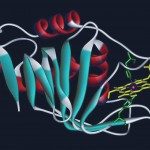Link to Pubmed [PMID] – 16774915
J. Biol. Chem. 2006 Sep;281(35):25541-50
HasA is an extracellular heme binding protein, and HasR is an outer membrane receptor protein from Serratia marcescens. They are the initial partners of a heme internalization system allowing S. marcescens to scavenge heme at very low concentrations due to the very high affinity of HasA for heme (Ka = 5,3 x 10(10) m(-1)). Heme is then transferred to HasR, which has a lower affinity for heme. The mechanism of the heme transfer between HasA and HasR is largely unknown. HasR has been overexpressed and purified in holo and apo forms. It binds one heme molecule with a Ka of 5 x 10(6) m(-1) and shows the characteristic absorbance spectrum of a low spin heme iron. Both holoHasA and apoHasA bind tightly to apoHasR in a 1:1 stoichiometry. In this study we show that heme transfer occurs in vitro in the purified HasA.HasR complex, demonstrating that heme transfer is energy- and TonB complex-independent and driven by a protein-protein interaction. We also show that heme binding to HasR involves two conserved histidine residues.

